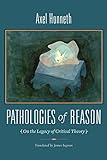Pathologies of Reason : On the Legacy of Critical Theory / Axel Honneth.
Material type: TextSeries: New Directions in Critical Theory ; 23Publisher: New York, NY : Columbia University Press, [2009]Copyright date: ©2009Description: 1 online resource (236 p.)Content type:
TextSeries: New Directions in Critical Theory ; 23Publisher: New York, NY : Columbia University Press, [2009]Copyright date: ©2009Description: 1 online resource (236 p.)Content type: - 9780231146265
- 9780231518376
- 300.1 22/ger
- HM585 .H65 2009
- online - DeGruyter
- Issued also in print.
| Item type | Current library | Call number | URL | Status | Notes | Barcode | |
|---|---|---|---|---|---|---|---|
 eBook
eBook
|
Biblioteca "Angelicum" Pont. Univ. S.Tommaso d'Aquino Nuvola online | online - DeGruyter (Browse shelf(Opens below)) | Online access | Not for loan (Accesso limitato) | Accesso per gli utenti autorizzati / Access for authorized users | (dgr)9780231518376 |
Frontmatter -- Contents -- Preface -- One. The Irreducibilit y of Progress -- Two. A Social Pathology of Reason -- Three. Reconstructive Social Criticism with a Genealogical Proviso -- Four. A Physiognomy of the Capitalist Form of Life -- Five. Performing Justice -- Six. Saving the Sacred with a Philosophy of History -- Seven. Appropriating Freedom -- Eight. "Anxiety and Politics" -- Nine. Democracy and Inner Freedom -- Ten. Dissonances of Communicative Reason Albrecht Wellmer and Critical Theory -- Appendix. Idiosyncrasy as a Tool of Knowledge -- Notes -- Bibliography
restricted access online access with authorization star
http://purl.org/coar/access_right/c_16ec
Axel Honneth has been instrumental in advancing the work of the Frankfurt School of critical theorists, rebuilding their effort to combine radical social and political analysis with rigorous philosophical inquiry. These eleven essays published over the past five years reclaim the relevant themes of the Frankfurt School, which counted Theodor W. Adorno, Max Horkheimer, Walter Benjamin, Jürgen Habermas, Franz Neumann, and Albrecht Wellmer as members. They also engage with Kant, Freud, Alexander Mitscherlich, and Michael Walzer, whose work on morality, history, democracy, and individuality intersects with the Frankfurt School's core concerns.Collected here for the first time in English, Honneth's essays pursue the unifying themes and theses that support the methodologies and thematics of critical social theory, and they address the possibilities of continuing this tradition through radically changed theoretical and social conditions. According to Honneth, there is a unity that underlies critical theory's multiple approaches: the way in which reason is both distorted and furthered in contemporary capitalist society. And while much is dead in the social and psychological doctrines of critical social theory, its central inquiries remain vitally relevant. Is social progress still possible after the horrors of the twentieth century? Does capitalism deform reason and, if so, in what respects? Can we justify the relationship between law and violence in secular terms, or is it inextricably bound to divine justice? How can we be free when we're subject to socialization in a highly complex and in many respects unfree society? For Honneth, suffering and moral struggle are departure points for a new "reconstructive" form of social criticism, one that is based solidly in the empirically grounded, interdisciplinary approach of the Frankfurt School.
Issued also in print.
Mode of access: Internet via World Wide Web.
In English.
Description based on online resource; title from PDF title page (publisher's Web site, viewed 02. Mrz 2022)


